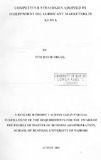| dc.description.abstract | Competitive strategy concerns what a firm is doing in order to gain sustainable
competitive advantage. This study was to establish the competitive strategies adopted by
independent Lubricant marketers in Kenya to meet the competition in the sector. The
study was done through a cross-sectional census survey .Primary data was used in this
study and was collected through questionnaires administered through a combination of
drop and pick, face to face interviews or electronically transmitted to all independent
Lubricants marketers who are currently active in the Kenyan Market as listed in
Petroleum institute of East Africa insight publication of 1st Quarter 2012. A response rate
of 63.6% was achieved. The study explored characteristics of marketers/factors that
influence the competitiveness and hence adoption of the various competitive strategies. In
this study the use of the term independent Lubricant marketers is used to differentiate
from the Multinational Lubricant marketers.
The results show that 78% of the independent Lubricants marketers have less than 20
retail outlets and majority were also engaged in other petroleum products business line
and were either in the process of entering the lubricants marketing or strengthening their
presence. Economic factors and intense rivalry within existing marketers was found to
have the greatest influence on the organizations competitive strategies. The study
established that the exiting of multinationals has opened up more opportunities for the
independent Lubricant marketers. However the factors influencing competition in the
lubricants business to the greatest extent were brand loyalty and Original equipment
manufacturers (OEM) recommendations. Some independent Lubricants marketers have
responded to this by getting into distributorship agreements with global partners,
enhancing their service levels and improving their overall technical capabilities.
vi The researcher deduced that the independent Lubricant marketers in Kenya generally
adopt competitive strategies in their operations. These tend to be replicated from the more established multinational oil companies but simplified to suit the local market condition.
This is because most customers view lubricants as a premium product, requiring extensive
Customer service, strict quality control and need proof of performance. So competitive
strategies used by independent Lubricant marketers are pre-dominantly differentiation and
Cost leadership. The study established that extensive customer service and influence over distribution channels were some of the competitive methods used to a great extent by the
Independent lubricant marketers as part of their differentiation strategy.
Finally it was established that there are other Lubricant marketers whose sales statistics
are not captured in either the Petroleum institute of East Africa data nor in those of
Ministry of Energy. An improved Lubricants business licensing and regulatory
framework should be able to address this and help in tackling the counterfeit business.
The researcher recommends further research should be undertaken on the link between
strategy and key industry success factors among Lubricants marketers in Kenya. A further research should also be undertaken on the strategic responses to challenges of
globalisation in the Lubricants Industry in Kenya. | en |

